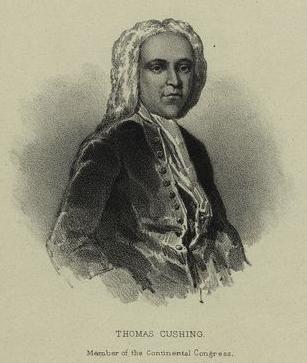Thomas Cushing
 Thomas Cushing III (March 24, 1725 – February 28, 1788) was an American lawyer, merchant, and statesman from Boston, Massachusetts. Active in Boston politics, he represented the city in the provincial assembly from 1761 to its dissolution in 1774, serving as the lower house's speaker for most of those years. Because of his role as speaker, his signature was affixed to many documents protesting British policies, leading officials in London to consider him a dangerous radical. He engaged in extended communications with Benjamin Franklin who at times lobbied on behalf of the legislature's interests in London, seeking ways to reduce the rising tensions of the American Revolution.
Thomas Cushing III (March 24, 1725 – February 28, 1788) was an American lawyer, merchant, and statesman from Boston, Massachusetts. Active in Boston politics, he represented the city in the provincial assembly from 1761 to its dissolution in 1774, serving as the lower house's speaker for most of those years. Because of his role as speaker, his signature was affixed to many documents protesting British policies, leading officials in London to consider him a dangerous radical. He engaged in extended communications with Benjamin Franklin who at times lobbied on behalf of the legislature's interests in London, seeking ways to reduce the rising tensions of the American Revolution.Cushing represented Massachusetts in the First (during which he signed the Continental Association) and Second Continental Congresses but was voted out when he opposed independence. Despite this, he remained politically active after independence, continuing to serve in the state government. During the Revolutionary War, he was a commissary responsible for provisioning the military, a position he used to enrich the family merchant business. He was elected the state's first lieutenant governor in 1780. Politically associated with fellow merchant Governor John Hancock, he remained lieutenant governor until his death in 1788, briefly serving as acting governor in 1785 between the resignation of Hancock and the election of James Bowdoin. Provided by Wikipedia
1
Book
2
3
Published 1889
Contributors: ';
“...Cushing, Thomas, 1821-1898....”
Record Source:
Published Materials
Book
4
Published 1975
Contributors: ';
“...Cushing, Thomas, 1821-1898....”
Record Source:
Published Materials
Book





